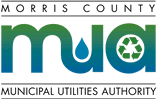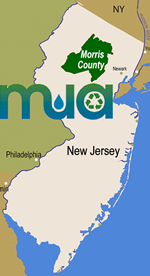Transfer Station Info (Tip Fee $113.00/ton)
- Mt. Olive Mon-Fri 7:30am-3pm; Sat 7:30am-11am
- Parsippany Mon-Fri 7am-3pm; Sat 7:30am-11am
- Closed Sundays and Major Holidays
- No Rental Trucks
- Payment by Account, Check, Credit Card. No Cash
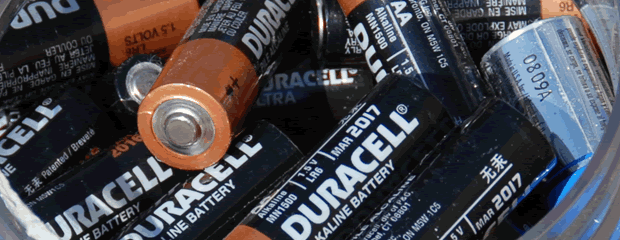
F.A.Q. Batteries Household (Dry Cell)
The MCMUA operates one of NJ's most comprehensive household hazardous waste (HHW) programs. This F.A.Q. page and information on hazardous materials is intended as a guide about HHW materials as well as the MCMUA's HHW program. This information is a general guide and does not constitute official rule, regulation or law.
Hazardous Waste Materials
- Adhesives
- Aerosols
- Antifreeze
- Appliances (CFCs)
- Art & Crafts
- Asbestos
- Batteries (Auto & Boat)
- Batteries, Household (dry cell)
- Cell Phones
- Compressed Gas Cylinders
- Driveway Sealer
- Electronics
- Fire Extinguishers
- Fluorescents
- Gasoline
- Medical Waste
- Kerosene
- Mercury
- Motor Oil & Filters
- Muriatic Acid (HCl)
- Paints & Stains
- Pesticides
- Photo Chemicals
- Pool Chemicals
- Propane
- Rock Salt
- Smoke Detectors
- Solvents
- Wood with Lead Paint
Figuring out how to manage batteries can be as easy as “1-2-3.” One (1), throw alkaline (non-hazardous and use-once) dry-cell batteries into the trash; two (2), recycle rechargeable batteries using Call2Recycle® drop-off boxes; and three (3), take all other types of batteries to a household hazardous waste disposal program where they will be properly managed as hazardous waste. Click here to view this information as a 2-page, downloadable and printable PDF.
Municipal Drop-Off Locations - With the 2010 USDOT change in regulations regarding the transportation of waste batteries, the MCMUA no longer accepts mixed batteries from municipal collection points and depots for recycling. Municipalities and residents are now encouraged to mange their spent batteries according to the "Easy as 1-2-3" suggestions listed on this page.
| 1 | 2 | 3 |
|
Alkaline Batteries (non-hazardous and use-once) |
Rechargeable Batteries (hazardous and multi-charge) |
Other Batteries (hazardous and use-once) |
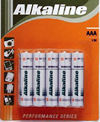 |
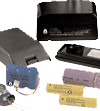 |
 |
|
|
|
|
| Throw in Garbage | Recycle with Call2Recycle® | Take to Household Hazardous Waste Program |
 |
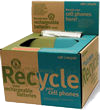 |
 |
Managing Household (Dry cell) Batteries is as Easy as 1-2-3
 1. Alkaline Batteries - Use-once alkaline batteries such
as AAA, AA, C, D and 9-volt batteries produced by manufacturers like Energizer and Duracell as
well as less common and/or generic manufacturers now fall below Federal and state hazardous
waste standards and can and should be thrown out in the ordinary garbage. These batteries types
account for the majority of batteries discarded. While regulations do not required these non-hazardous
batteries to be individually bagged or have their terminals covered, prior to placing into the garbage,
it is still prudent to do so in an effort to minimize the risk of fire, especially with 9-volt batteries. The MCMUA and most Morris County municipalities stopped
accepting alakaline batteries for recycling in November 2009. Note, this category also includes
carbon zinc (heavy duty) batteries which can also be disposed of in the garbage.
1. Alkaline Batteries - Use-once alkaline batteries such
as AAA, AA, C, D and 9-volt batteries produced by manufacturers like Energizer and Duracell as
well as less common and/or generic manufacturers now fall below Federal and state hazardous
waste standards and can and should be thrown out in the ordinary garbage. These batteries types
account for the majority of batteries discarded. While regulations do not required these non-hazardous
batteries to be individually bagged or have their terminals covered, prior to placing into the garbage,
it is still prudent to do so in an effort to minimize the risk of fire, especially with 9-volt batteries. The MCMUA and most Morris County municipalities stopped
accepting alakaline batteries for recycling in November 2009. Note, this category also includes
carbon zinc (heavy duty) batteries which can also be disposed of in the garbage.
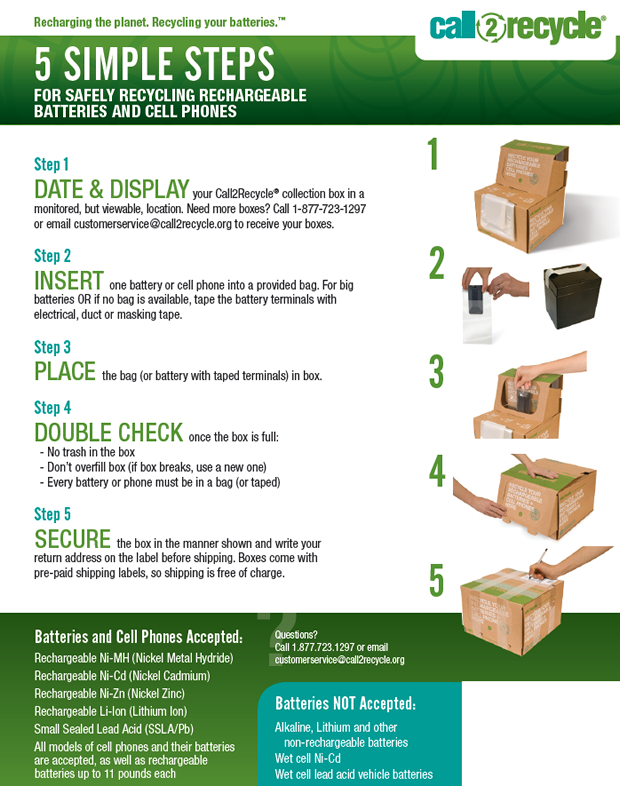 2. Rechargeable Batteries - The
Rechargeable Battery Recycling Corporation (RBRC) operates Call2Recycle®, a free
rechargeable battery recycling program. Call2Recycle® sets up retailers and
public agencies as rechargeable battery drop-off locations at no cost to the
participant. Currently, Home Depot, Radio Shack, Lowe’s and Verizon Wireless
all participate in the Call2Recycle® program at all their retail locations. These
locations are provided with a drop-off box with small plastic bags so the batteries can
be individually bagged in accordance with the new DOT regulations. The RBRC pays all
the costs associated with providing drop-off boxes, including transportation and recycling. Call
1-877-2-RECYCLE or use their website at http://www.call2recycle.org
to find the closest public drop-off point.
2. Rechargeable Batteries - The
Rechargeable Battery Recycling Corporation (RBRC) operates Call2Recycle®, a free
rechargeable battery recycling program. Call2Recycle® sets up retailers and
public agencies as rechargeable battery drop-off locations at no cost to the
participant. Currently, Home Depot, Radio Shack, Lowe’s and Verizon Wireless
all participate in the Call2Recycle® program at all their retail locations. These
locations are provided with a drop-off box with small plastic bags so the batteries can
be individually bagged in accordance with the new DOT regulations. The RBRC pays all
the costs associated with providing drop-off boxes, including transportation and recycling. Call
1-877-2-RECYCLE or use their website at http://www.call2recycle.org
to find the closest public drop-off point.
Additionally, Call2Recycle® will provide free-of-charge drop-off boxes to any non-residential entity for the collection and recycling of their own rechargeable batteries. All one has to do is sign up online at http://www.call2recycle.org. Retailers and community recycling centers open to the public will be listed on the Call2Recycle® zip code locator and toll-free help-lines to encourage residents to recycle. Additionally, public agencies and businesses can still participate in the Call2Recycle® program without being advertised as a public drop-off location if they do not want to listed as such. Since everything is free of charge, the MCMUA is encouraging every business and/or public agency to request a drop-off box for its office or work site.
Batteries covered under the Call2Recycle program must be rechargeable and include:
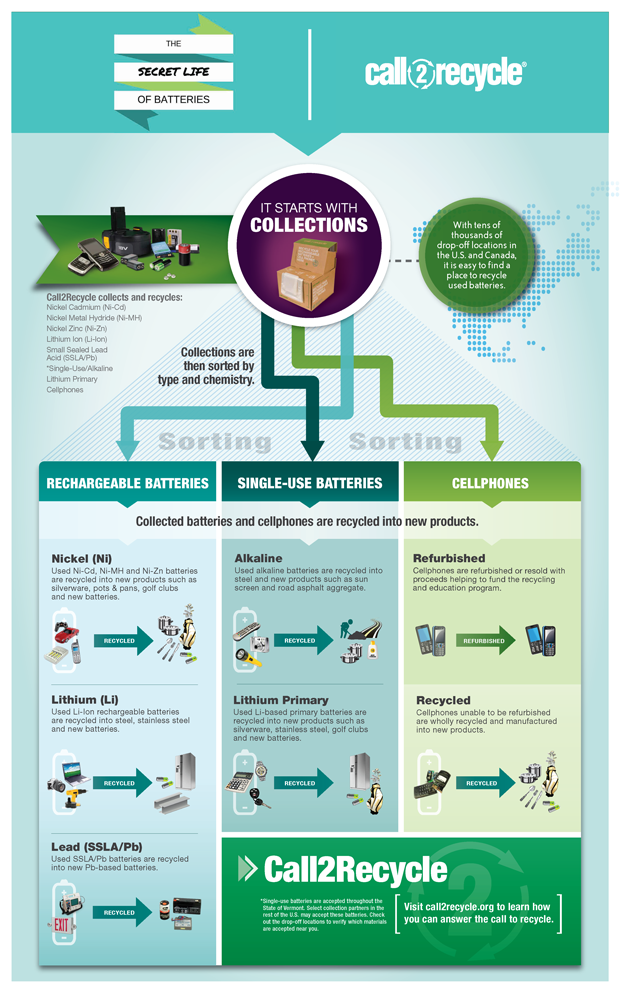
- Nickel Cadmium (Ni-Cd)
- Nickel Metal Hydride (Ni-MH)
- Lithium Ion (Li-ion)
- Nickel Zinc (Ni-Zn)
-
Small Sealed Lead - less than 11 lbs (Pb)
Call2Recycle® Retail Drop-Off Locations: The batteries listed above can be recycled at any one of the following retail locations:
- Best Buy
- Home Depot
- Lowes
- Staples
- Other Local Wireless and Hardware Store
In addition, the stores listed below are likely to accept rechargeable batteries for recycling but please contact them first hjust to make sure.
- Batteries Plus
- Black & Decker
- Orchard Supply Hardware
- Porter Cable/li>
- Remington
- Sears
- Target
- Walmart
- Wireless Zone
Rechargeable batteries are found in cordless power tools, cellular and cordless phones, laptop computers, digital cameras, two-way radios, camcorders, and remote control toys. Rechargeable batteries sometimes look like regular alkaline batteries. The label on the battery will indicate if it is rechargeable. Note, cell phones can also be collected through the Call2Recycle® program.
3. Other Batteries - Non-rechargeable and large (over 11 lbs) lead-acid batteries make up this category. The proper management for these batteries is to take them to a household hazardous waste disposal program. Information about Morris County’s household hazardous waste programs can be found at the MCMUA website or by calling 973-829-8006.
- Button Cell Batteries - Most of these batteries still contain mercury and should be taken to a household hazardous waste program for proper management.
- Lead-Acid Batteries - While rechargeable lead-acid batteries contain lead and are often used for car and boat batteries (over 11 lbs) should also be taken to a household hazardous waste program.
-
Disposable Lithium Batteries - Use-once, non-rechargeable lithium batteries
(AA, C, 9 volt and coin); mainly used in computers and cameras, are reactive with water, and
can cause serious fires. If lithium batteries are non-rechargeable they must be
delivered to a hazardous waste program for proper management.

Hazards of Batteries Household
- Hazardous batteries burned in waste combustion facilities can release mercury or cadmium to the air and water, ultimately entering the food chain and posing health threats to people and the environment.
-
With the adoption of the
Morris County Recycling Plan Update as of October 2007 only hazardous dry cell
batteries are mandated to be source separated and recycled. Non-hazardous dry cell batteries are acceptable
and are to be disposed of in the solid waste stream (trash). Keep reading below for additional
information on this distinction.
In addition to rechargeable batteries which are hazardous and need to be recycled, non-rechargeable, hazardous batteries such as non-rechargeable lithium, silver oxide, mercury and magnesium button-type batteries, etc. need to be brought to a hazardous waste disposal program for proper management.
It should be noted that domestically manufactured alkaline and carbon zinc non-rechargeable batteries made after circa 1994 eliminated mercury content to the point that they are not be considered hazardous and therefore are not included in the list of materials mandated to be source separated and recycled. The proper management of these non-hazardous batteries is to throw them in the regular garbage.
MCMUA's Facility Database
- Solid Waste Facilities (All Types)
- Class Municipal Recycling Depots
- Recycling Markets
- Non-Regulated Drop-Off Location
- Class "D" Recycling Facility (Special)
- Hazardous Waste Facilities
Handling Batteries Household (Dry Cell)
- Store in a secure, dry place out of the reach of children and pets. Button batteries can be swallowed because they are small and slippery.
-
When storing rechargeable batteries for collection, keep in a vented, non-metal
container. Rechargeable batteries should be placed individually in plastic bags before
being stored together with other rechargeables.
